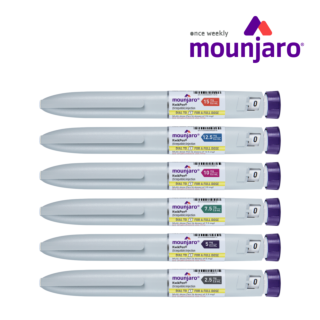Mounjaro side effects and how to treat them
What are the side effects of Mounjaro? Starting any new treatment can be daunting, as there are many things you need to be aware of, including the potential side effects and how to handle them.
Like all medications, Mounjaro can cause side effects, but not everyone will experience them. If you’re already beginning to experience side effects, then you’ll want to know how long Mounjaro side effects last.
In this guide, we’ll discuss the different side effects of Mounjaro injections and how you can manage them to help make your weight loss journey as smooth as possible.
What are the side effects of Mounjaro?
When you begin using Mounjaro, you might experience some side effects. These usually begin within a couple of weeks after starting the treatment. Over time, your body starts to adjust to the medicine.
Common side effects of Mounjaro include:
- Nausea
- Vomiting
- Diarrhoea
- Decreased appetite
- Constipation
- Indigestion & acid reflux
- Stomach pain
- Bloating
- Sulphur burps

How to deal with nausea and vomiting caused by Mounjaro
It’s common to experience side effects such as nausea and vomiting while on Mounjaro. Tirzepatide (Mounjaro’s active ingredient) slows down digestion, which can cause food to stay in your stomach for longer, leading to nausea.[1]
To help manage your side effects, you should continue to drink plenty of water and eat smaller meals or water-based foods, such as soups, to help with nausea. You should also stop eating when you are full, avoid fatty foods and try to eat bland foods like toast, crackers and rice.
Read our other guide for more information on the best Mounjaro diet and the foods and drinks you should avoid.
How to deal with bloating and sulphur burps caused by Mounjaro
Bloating and sulphur burps can be quite common when you are on Mounjaro due to the delayed emptying of the stomach.
Green tea, chamomile tea and peppermint tea can aid digestion and have been known to reduce sulphur burps. You should keep yourself hydrated, as sufficient water protects the stomach from bacteria and can help your digestive system break down heavier proteins and sulphur-containing foods. Eating smaller portions and less processed food may also help.
Medications that contain simethicone or dimethicone, such as Wind-Eze or Windsetlers, can help to reduce gas.
How to deal with constipation and diarrhoea caused by Mounjaro
Constipation is a common side effect of Mounjaro. GLP-1 receptors can slow down gastric emptying, meaning that food stays in your stomach for longer.
If you experience side effects such as constipation and diarrhoea, speak to one of our pharmacists. They can help you with these symptoms by providing you with treatment, which is usually free.
Diarrhoea can be uncomfortable and cause stomach pains, nausea and decreased appetite. It’s usually a result of gut motility changes. Drinking plenty of fluids, such as water or juice, may help with diarrhoea.
You should try to avoid drinks that contain caffeine, alcohol or pure fruit juice, as these can act like laxatives.
To help with constipation, try including high-fibre foods in your diet, such as beans, vegetables and fruit. Fibre helps with gut motility and stool softening, making bowel movements more regular. Regular moderate exercise can also help with healthy bowel movements.
If your constipation persists, your healthcare provider may offer laxatives. Laxatives change your digestive system, making it easier to go to the bathroom. Some work by making your stool softer, and others stimulate the muscles in your colon to move the stool along.
Decreased appetite from Mounjaro
When used for weight loss, one of the most common side effects of Mounjaro is a decreased appetite. This is perfectly normal and means the medicine is working as it should. With a reduced appetite, you are likely to consume fewer calories, which in turn causes weight loss.
Eating smaller meals that include foods from each food group will help you get all the necessary nutrients. If you’re unable to get the correct nutrients into your diet, vitamin supplements might help you get the nutrients you are missing. However, vitamins are not a substitute for a balanced diet.
How to deal with indigestion, acid reflux and stomach pains caused by Mounjaro
The active ingredient in Mounjaro, tirzepatide, slows down the digestive system, which can lead to indigestion and acid reflux.
Ginger, peppermint and apple cider vinegar are natural ingredients that might help ease indigestion. Eating smaller portions and not lying down within an hour of eating can prevent acid reflux. Antacids and acid reflux medications, which help neutralise stomach acid, are also available.

Hair loss and Mounjaro
Although Mounjaro doesn’t directly cause hair loss, rapid weight loss and a lack of nutrients can impact healthy hair growth. The stress on the body caused by rapid weight loss can affect hair growth.
Hair loss experienced from weight loss is typically mild, and hair loss should stabilise over time.
You may not eat a balanced diet because your appetite is reduced, but you must ensure that you are getting enough protein. You can also take a vitamin and mineral supplement specifically for healthy hair.
Avoiding low blood sugar levels on Mounjaro
When using Mounjaro alone, it shouldn’t cause low blood sugar. However, if you are taking other medications, including other diabetes medications alongside Mounjaro, then you could be at a higher risk of hypoglycemia (low blood sugar).
You must tell your prescriber if you are taking any other medications before you start using Mounjaro.
If you have diabetes, it’s essential to let our team know in your consultation notes.[2]
Your blood sugar levels can be monitored with a continuous glucose monitor (CGM). Certain medications, such as beta-blockers, can hide the symptoms of low blood sugar in diabetics. If you’re diabetic and take beta blockers, be extra vigilant and measure your blood sugars regularly.
Symptoms of low blood sugar include:
- Tremor
- Sweating
- Hunger
- Tiredness
- Dizziness or weakness
How long do the side effects of Mounjaro last?
The side effects of Mounjaro can differ from person to person; your personal or family history can also play a role. These side effects normally last for a few days or weeks. The mild side effects will usually go away on their own, and they don’t need any treatment.
Once your body adjusts to Mounjaro, it’s likely that these symptoms will subside. However, if they do last longer or they’re severe and impacting your daily life, it’s important that you speak to your prescriber for advice.
Start your Mounjaro consultation
Managing your Mounjaro side effects after your dosage increases
When you start to increase your dosage of Mounjaro, you might become aware that your symptoms are more noticeable; they may even worsen. Again, your body needs to adjust to the higher dose before the symptoms start to ease. Your prescriber will tell you when to increase your Mounjaro dose.
When the dose of Mounjaro is increased, the worst symptoms—nausea, vomiting and diarrhoea—typically occur. After a short while, these symptoms decrease.
Over-the-counter (OTC) remedies are useful for most mild side effects of Mounjaro, such as bloating and stomach discomfort. You can also take painkillers such as paracetamol to ease stomach discomfort.
If you take a break from Mounjaro, your side effects can worsen. You may experience an increased appetite, nausea and weight gain.
However, if you are experiencing severe symptoms that interrupt your daily life, you must contact your prescriber so they can advise you on how to manage your side effects.
Are there any long-term side effects of Mounjaro?
Mounjaro has a good safety profile, and unwanted long-term effects are unlikely, but you should report any unusual symptoms to your prescriber.
You may develop issues with your pancreas, gallbladder, or kidneys. These are rare. If you notice any unusual symptoms in your abdomen or the area of your kidneys, you should report this to us or your GP.
If you notice any neck swelling or pain in the throat area, you should also mention this to a healthcare professional.
Serious side effects of Mounjaro
Some people may experience serious side effects, but this is rare. Serious unwanted effects of Mounjaro include:
- Severe digestive problems
- Acute kidney injury
- Gallbladder problems
- Pancreatitis
- Increased risk of thyroid cancer
- Hypoglycemia (low blood sugar)
- Changes in vision
- Severe stomach problems
- Serious allergic reactions
These serious side effects are rare, so don’t let them put you off taking this medication. For example, clinical trials concluded that less than 1% of patients had gallbladder problems due to Mounjaro.[1]
A further study on Mounjaro proves the chances of experiencing severe side effects are minimal. The study found that only 5.4% of patients reported adverse side effects.[2]
When to see a doctor
If you are experiencing severe side effects that don’t go away on their own or with management, you should contact your doctor or prescriber for advice. As soon as you experience any severe unwanted effects, it’s important that you speak to a healthcare professional immediately so that you can get medical treatment.
If your side effects become unbearable or you feel like they are very serious or life-threatening, then you should either call 999 or visit Accident and Emergency (A&E) straight away.

Allergic reactions while using Mounjaro
An allergic reaction to Mounjaro can vary from mild to severe. A severe allergic reaction is classed as a medical emergency as it can be life-threatening. Mild or severe symptoms of an allergic reaction can include:
- Skin rash
- Itching
- Flushing
- Swelling under your skin, in your eyelids, lips, hands or feet
- Swelling of your mouth, tongue or throat, which can make it hard to breathe
If you believe you are experiencing any symptoms of an allergic reaction, you should contact a healthcare provider immediately. Your healthcare provider or prescriber will assess the situation and decide whether to discontinue Mounjaro.
If you are experiencing severe symptoms of an allergic reaction, call 999 or visit A&E immediately.
Serious hypersensitivity reactions can occur in users of Mounjaro. These include anaphylaxis and angioedema.
Will I have to end my Mounjaro treatment if my symptoms are severe?
If you start experiencing severe side effects from Mounjaro, you should speak to your prescriber immediately. They will be able to advise you whether to continue using It.
If it’s decided that terminating the treatment is the best option for you, then other treatments will be discussed so that you can continue your weight loss journey.
The severity of your symptoms will help your prescriber decide whether to discontinue your treatment. If your symptoms are serious, you will likely be advised to end your treatment.
Symptoms caused by accidental overdose
If you have accidentally overdosed on Mounjaro, then please contact us or your GP as soon as possible. You might notice you are experiencing symptoms you haven’t so far. Your current symptoms may also worsen. You should seek help immediately if you accidentally overdose.
Does your medical or family history make you more likely to experience side effects?
Your medical history can put you at an increased risk of experiencing problems when using treatments like Mounjaro.
If you have a diagnosis of gastroparesis, then it would be dangerous to use Mounjaro, as this could worsen this condition.
We cannot recommend Mounjaro if you have a history of an eye condition called diabetic retinopathy.
If you have a personal or family history of medullary thyroid carcinoma (MTC) or a history of multiple endocrine neoplasia syndrome type 2 (MEN2), treatment with Mounjaro is not advised. Your healthcare provider will talk you through other weight loss options. [3]
Will I get withdrawal symptoms after treatment?
Mounjaro is not a stimulant, so you should not feel withdrawal symptoms when you stop treatment. However, some users may experience side effects when they stop using Mounjaro. These include:
- Headaches
- Insomnia
- Increased appetite
- Increased cravings
If you have titrated up to the higher doses of Mounjaro, you may need to reduce your dose gradually at the end of your treatment.
After you have stopped treatment, it’s essential to maintain the good habits you adopted while using it, such as a healthy, balanced diet and frequent exercise to ensure you don’t regain weight.
How can I treat my Mounjaro side effects?
If you have tried natural remedies and over-the-counter treatments and your side effects of Mounjaro haven’t improved, you can speak to one of our pharmacists. They will provide a consultation and recommend a treatment, which is usually free.
Always remember to speak to your prescriber if you are struggling with Mounjaro's side effects. They can advise you on how to manage them.

Mounjaro can help you achieve your long-term weight loss goals, so don’t let the long list of side effects intimidate you.
The benefits of Mounjaro outweigh the risks, and these injections could provide you with a healthier and happier life overall. We understand that some of the severe side effects might cause concern, but rest assured, the likelihood of experiencing them is very slim.
Your weight loss journey is individual to yourself. You must keep an eye on your side effects. Not everyone will experience them, and if you do, in most cases, they will go away on their own.
Start your Mounjaro consultation










